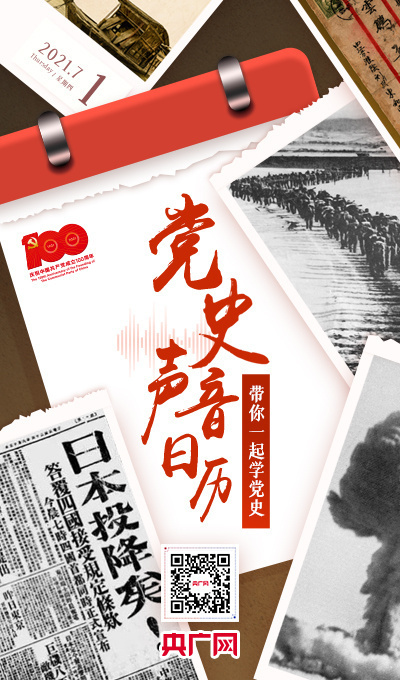In order to celebrate the 100th anniversary of the founding of the Communist Party of China, the Central Broadcasting Network launched the "Party History Sound Calendar", which takes you through a hundred years of time with sound.
【Today in the History of the Party】
On October 10, 1947, the headquarters of the Chinese People's Liberation Army issued a declaration, resoundingly put forward the slogan of "Down with Chiang Kai-shek and Liberate All China".

By July 1947, the total strength of the Kuomintang army had dropped from 4.3 million to 3.73 million, of which the regular army had dropped from 2 million to 1.5 million. The total strength of the People's Liberation Army increased from 1.27 million to 1.95 million, of which nearly 1 million were regular troops, and the weapons and equipment were greatly improved. The Party Central Committee immediately made a decision and decided not to wait for the complete smashing of the enemy's strategic offensive, but immediately turned to a nationwide counter-offensive and used the main force to fight to the outside line and lead the war to the Kuomintang area.
As the People's Liberation Army shifted to a strategic offensive, in September 1947, the Communist Party of China issued a call for a "nationwide counteroffensive to overthrow Chiang Kai-shek." On October 10, the headquarters of the Chinese People's Liberation Army issued the "Declaration of the Chinese People's Liberation Army", which resoundingly put forward the slogan of "Down with Chiang Kai-shek and Liberate All China".
"Declaration of the people's liberation army Chinese" (Source: National Museum)
The manifesto enumerated Chiang Kai-shek's crimes of waging civil war, suppressing the people, expropriating tyranny, and betraying the country and dictatorship against the people, and pointed out that "in all areas ruled by Chiang Kai-shek, corruption is everywhere, secret agents are rampant, taxes are heavy, prices are high, the economy is bankrupt, hundreds of industries are depressed, conscription of troops and grain, and complaints are rife." In this way, the overwhelming majority of the people of the whole country are in dire straits."
The manifesto put forward eight basic policies: overthrow chiang kai-shek's dictatorial government and establish a democratic coalition government; arrest, trial, and punish criminals of the civil war headed by Chiang Kai-shek; abolish the dictatorial system of Chiang Kai-shek's rule and implement the people's democratic system; abolish the corrupt system of Chiang Kai-shek's rule, eliminate corrupt officials and officials, and establish a clean politics; confiscate bureaucratic capital and develop national industry and commerce; abolish the feudal exploitation system and implement the system of cultivators owning their own land; recognize the right of all ethnic minorities in China to equal autonomy; deny all traitorous diplomacy. Treaties of equality, reciprocity, trade and friendship with foreign countries.
After the slogan "Down with Chiang Kai-shek and Liberate All Of China" was put forward, it was widely posted wherever the army passed. The slogan won the enthusiastic support and response of the people, pointed out to the people of the whole country the general goal of completely liberating the whole country, and played a major role in promoting the rapid development of the entire liberation war.
(Source: China Military Network China Net National Museum)
Director system: Yu Feng Gao Yang
Editor: Gao Yang
Executive Producer: Wang Wei Ma Yuan
Planner: Zhao Jing
Audio Producer: Wu Kexin
Anchor: Liu Jiaming
Design: Ying Chen
Source: CCTV